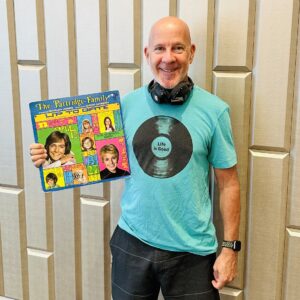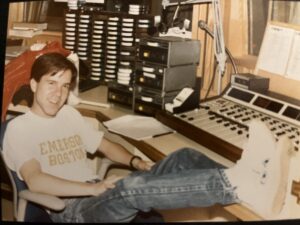By Matt Robinson
Contributing Writer
BOSTON – “I never wanted to do anything else!” This is how DJ, writer, and dance party impresario Barry Scott responded when asked what inspired him to be a radio disc jockey. His radio show “The Lost 45s” had endured for over 40 years, and has been in worldwide syndication since 1993. It brings back to life many pop songs from the seventies and eighties that you may have thought you’d never hear again.

Early start
Starting at the age of five, Scott would play music in his home, talking between each track. “My heroes were mostly local jocks like Dick McDonough from WDRC [in] Hartford and Dale Dorman in Boston,” Scott explained.
Scott’s platter-programming proclivities revealed themselves early on, for when he took a career aptitude test in high school, the results suggested “radio announcer.”
Naturally, Scott went to Emerson College, which has one of the strongest media programs in the world. Ever eager to please his audience, Scott insisted on playing the actual songs that his fellow students requested, even if they had fallen off the charts elsewhere.
“Listeners kept asking for records…that no one else had played,” he recalled, citing such popular picks as those by Helen Reddy, Sonny and Cher, Tony Orlando and Dawn, the Osmonds, and the Partridge Family.

In catering to his campus’ calls, Scott birthed a radio revolution that has lasted nearly as many years as its title suggests—“The Lost 45s.”
National recognition
Though some of the songs were no longer considered popular, the show Scott created was soon being written up not only in The Boston Globe and Boston Herald, but in Radio & Records and Billboard—the keeper of the charts.
“[That] secured my first commercial Boston radio job upon graduation,” Scott smiled, noting that the show now airs Sunday nights from 6 to 9 p.m. on Easy 99.1 FM.
While many of the artists featured on his show received regular airplay, Scott seeks songs that may not have had their full due and defines a “lost” song as, “a record…that didn’t receive adequate airplay…since it left the charts.”
Scott continued to play ABBA’s lesser-known hits even when the group’s greatest hits album “Gold” came back to the top of the charts and after the later success of the Broadway smash (and hit movie) “Mamma Mia, But he saved the song “Dancing Queen” for his popular live events.
“It still makes people dance,” he observed, noting that many of his listeners also ask for songs that they think should have charted higher but didn’t. “We call them ‘shuddabeen’ hits,” he said.
Aging with the audience
When asked about his “core” audience (or, as they say in the broadcasting world, “target demo,”) Scott suggests that it has grown with him and even split into multi-generational camps.
“The Lost 45s has always been popular with adults who grew up with these artists and records,” he observed. “As well as their kids, who either found them fun, silly or were totally unfamiliar with them since they weren’t the normal hits being played to death by all other radio stations.”
In fact, even in recent years, Scott has been hearing from multiple generations of the same families, many of whom eschew AI-induced corporate media.
“During the seventies, there was tons of variety on Top 40 music stations,” Scott reminisced.
“As radio became more corporate, stations appeared that were more focused on a particular genre,” he explained. “With managers telling entire station chains what to play, whittling down playlists to a very narrow group of records and leaving out any chance for local hits.”
As a result, Scott has been providing a unique service to millions of music fans by playing B-sides and so-called “one-hit wonders” that do not sell as well and so do not get played on most other stations.
“I’m proud to say virtually none of those over-played ‘hits’ have ever been played on The Lost 45s,” Scott noted. “When you put on the show, you always know…we are playing different records and artists.”
Reviving careers
In addition to bringing families together and back to radio, Scott has also been credited with reviving many musical careers, including one of a local family.
“The Rhode Island based Cowsill family (who had been the original Partridge Family inspiration) hadn’t performed together in quite a few years when Bob Cowsill was a guest on the show in 1990,” Scott recalled, pulling from the world’s largest library of recorded artist interviews and touting one of his favorite locally-sourced stars. “He sent the interview to the rest of the family, and they got together for their first tour in a decade!”
Among the other stars who re-found fame after talking with Scott are such living legends as Paul Anka, Neil Sedaka and Frankie Valli. Coincidence?
In any case, when asked for his own favorites, Scott demurred, but noted that “Seasons in the Sun” by Terry Jacks (who just happened to be Scott’s first on-air interview) and “I Think I Love You” from the Partridge Family featuring David Cassidy are probably the most requested and played songs in his show’s 40-plus year history.
“There’s simply too many ‘Lost 45s’ to play to keep repeating,” he maintained.
Raising money and awareness for AIDS
Another group from which too many have been lost is the seemingly endless list of artists who died from AIDS. To stem the tide and support his fellow creatives, Scott started the “Aim for the Heart” radiothon to raise money and awareness in the early years of the tragic virus that took many of Scott’s closest friends.
“Every Valentine’s Day,” he remembered, “we spent an entire radio station day chatting with educators, doctors, people with HIV/AIDS as well as family members of those who had passed on.” He also organized a concert called “The Lost 45s Against AIDS” that featured his beloved Cowsills, along with such other Lost 45s legends like Captain and Tennille, Mark Lindsay of The Raiders, Tony DeFranco, Alan O’Day, and Bobby “Boris” Pickett.
“It’s one of my all-time highlights,” he beamed. “That was one hell of a show!”
Entertaining seniors
Though he recently ran his final official “Top 100” countdown this past Labor Day weekend, Scott is far from done with championing great music. In addition to producing other features, specials, and countdowns on the radio, he is still making many live appearances, hosting dance parties, interviewing more recording legends, and using his talents to support fans who have been with him since the beginning by sharing old favorites with various senior communities.
“My dad had Alzheimer’s,” he explained. “Near the end of his life, about the only time he would look directly into my eyes was when an Elvis Presley or fifties doo-wop song came on. After he passed, I was driving by an assisted living facility when a Frankie Valli song came on, reminding me of him. Although I’d passed that location hundreds of times, this time I turned in and spoke to the director.”
Offering recorded music and music-related trivia (both of which have been shown to help keep the mind sharp and the heart rate in a safe zone), Scott’s senior shows are a hit throughout the region.
“People who didn’t react to anything before [are]…singing, clapping and even dancing,” he observed. “They come more alive and their smiles are priceless!”
And Scott also finds that he is not always the only one sharing.
“One woman told me she was in the Ed Sullivan audience when the Beatles made their TV debut,” he recalls. “These stories are always sweet for me to hear.”
Even though the final live top 100 countdown has aired, fans can revisit and relive their favorite musical highlights on Scott’s website (www.lost45.com).
“We are also syndicated across the world…and have a database of shows from the past five years and a classic show is spotlighted every month,” Scott said, noting that he is looking forward to visiting more senior communities, hosting more dance parties, and writing more books and maybe a screenplay.
“I have always loved what I do and for that I am eternally grateful,” Scott said in conclusion, and is looking forward to his 43rd year of “rescuing” favorite songs and artists. “My fans are the best and most vocal around. I can’t thank them enough for making the dreams of a five-year-old DJ come true!”
RELATED CONTENT:
Veteran Boston DJ has also chronicled the rock world as an author












